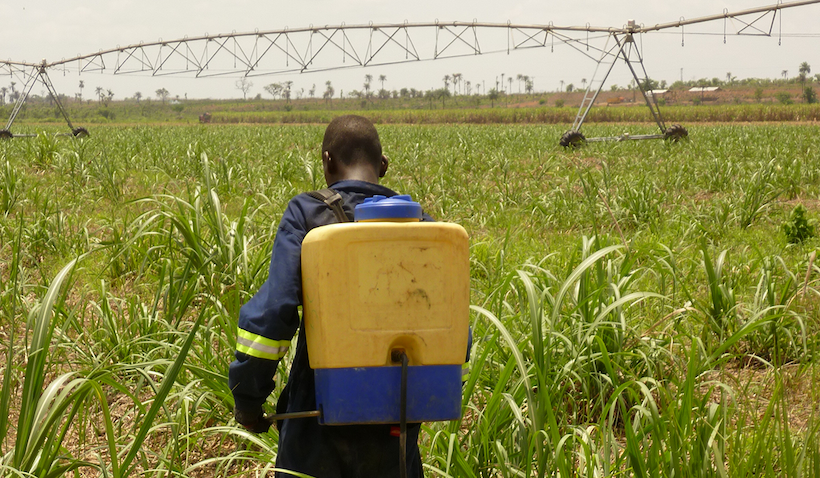Three new case studies show: In the context of large-scale land investments in Africa, human rights violations and social as well as environmental damages are the rule, not the exception. The message of the studies is therefore clear: development banks and their governments must do more for human rights and take responsibility for damages caused.
In March last year, EU Commission President Ursula von der Leyen said: “Today's Strategy with Africa is the roadmap to move forward and bring our partnership to the next level. Africa is the European Union's natural partner and neighbour. Together we can build a more prosperous, more peaceful and more sustainable future for all.” So far, however, such a shared future seems to be far away.
Together with a broad network of African and European civil society partner organisations, Bread for the World has published three case studies. They show: Many civil society organisations and groups representing smallholder farmers, pastoralists and local communities in Africa repeatedly report human rights violations and conflicts in connection with economic projects organised and financed from Europe and the associated land acquisition. For the EU-Africa Summit in 2022, the aim must therefore be to put the issues of good land governance, land rights and the avoidance of violent resource conflicts on the agenda.
Rapid increase in land acquisition
The demand for land and natural resources has significantly accelerated in the last two decades due the 2008 food price crisis and resulting land speculations. This led to a surge in large-scale land acquisitions (LSLAs), often referred to as land grabbing. Since 2000, over 25 million hectares of land deals have been carried out across the African continent according to the Land Matrix Initiative.
While private actors are largely the ones executing LSLAs, their land acquisitions are encouraged and financially supported by governments. This includes governments within the Global South, which reduce barriers for land transfers, as well as governments within the Global North, many of which finance these land deals via their public development banks. The policy brief series is particularly concerned with a complex web of financers, namely private equity funds and European development finance institutions, which have either indirectly or directly financed numerous land acquisition projects in Africa. These LSLAs have coincided with human rights violations and conflicts, with local communities bearing the burden of the harm generated - as also the case of the Addax & Oryx Group (AOG) in Sierra Leone shows.
Companies and development banks make common cause
The Swiss company AOG invested 500 million euros in the Makeni project in the Republic of Sierra Leone, which was then operated by "Addax Bioenergy Sierra Leone Ltd" (ABSL). The project, a sugar cane plantation, an ethanol refinery and a biomass power plant, was partly financed by AOG and by seven European and African development banks (Development Finance Institutions/DFI). After a massive cutback in production in 2015, ABSL announced in 2016 that it was pulling out of the project. The land was then passed on to Mauritius-based Sunbird Bioenergy Africa Ltd, and again in 2018 to a new investor Brown's Investment PLC from Sri Lanka. "What will happen to our land now that Addax is gone?" asked residents from the Makeni region.
With the study "The Weakest should not bear the Risk" we pointed out the failure of the large-scale project and the co-responsibility of the development banks and governments. The people who used the land and through this secured their livelihoods and food for their families before the company leased the land, complain that both their land rights and their right for meaningful consultation and free prior informed consent (FPIC) were disregarded. During the clearing measures at the beginning of the project, water sources were destroyed and the river polluted, so that many people no longer have clean drinking water. Lease payments for the land and compensation for cleared oil palms or mango trees did not correspond to the actual value that long-term use has for the families. In addition, people repeatedly complain that the lease payments are only made irregularly and often late. Many residents have become unemployed after the end of the large-scale project, and frustration and lack of prospects, among other things, have contributed to an increase in domestic violence. Who is now responsible for those social, economic and environmental damages caused by the project and provides compensation?
Massive consequences for the people
Our local partner organisation, the Sierra Leone Network on the Right to Food, has repeatedly pointed out failures and developed proposals on how to avoid human rights violations and violence. But the demands of civil society and residents have hardly been met. Even today, five years later and with the second new investor, it is still not clear what will happen to the land.
One of the lessons from this case is that companies, investors, banks and governments need to pay much more attention to the conflict context, in addition to their human rights due diligence obligations. The UN Working Group on Business and Human Rights called for this in its 2020 report on business and human rights in fragile situations and conflicts. This includes developing early and responsible exit strategies through which the company and its supporters at least compensate the affected communities for the damage and negative consequences.
The large-scale project in Sierra Leone was supported by the German Investment and Development Company/DEG with a loan until 2015. But since the then company ABSL has fully repaid its loans, the development banks no longer see themselves as responsible for compensating the damage caused to the local population.
We see it differently and demand from the development banks and the German government that they show responsibility for the compensation of consequential damages of the projects they support. This also includes making funds available for sustainable development in the affected regions.
And we demand that in future more attention be paid to human rights due diligence and the avoidance of measures that exacerbate conflicts. Furthermore, support for large-scale projects involving large-scale land investments should be withdrawn in the future.


